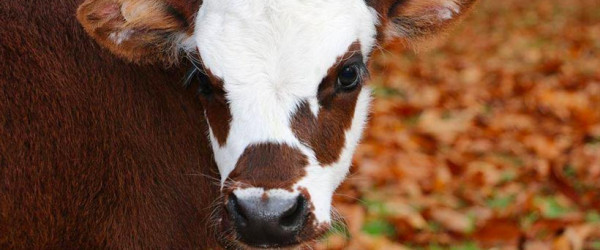
The altar of sacrifice: The tragedy of bobby calves in New Zealand
June 20th, 2018Bobby calves in New Zealand are a sacrificial animal who are slain at the altar of the economy. We kill them so that their mothers’ milk may flow, and we can have a thriving dairy market. A bobby calf is the progeny a dairy cow who is deliberately bred from so she will produce milk. If not kept for replacement or for beef production, the young calf will be considered surplus to requirements. These calves receive a death sentence. They were born to die.
We sell their mother’s milk to many places internationally, but the latest market in China is burgeoning . Milk can be supplied to China in its fresh form, where it has a shelf life of 16 days. That’s over twice the life of the calves who lived and died for it.
The launch of fresh cows’ milk from New Zealand to overseas consumers is a niche market and one that the dairy industry is keen to capitalise on. It seems ludicrous, in an era of climate change, that we should further compound the damage done though methane emissions of dairy agriculture by flying planes of fresh dairy produce overseas. The ecological footprint is phenomenal.
But I am more concerned about our unethical footprint, which in my view is gigantic. While the wealthy and middle-class Chinese tuck into fresh New Zealand milk, calves die. They die like flies. Their value is often nothing more than a gold coin.
Put it this way, you would pay more for a flat white than you would for a low-weight bobby calf. AC Petfoods, which operates in the greater Waikato region, offers farmers $1 for calves who weigh between 17-24 kgs. Medium calves fetch $10 and larger calves for $20.
You could buy around five bobby calves for the price of a cup of coffee made from their mothers’ milk.
I have done just that. Through my project Starfish Bobby Calf Project, I have saved many of these tiny beings in my life. One tiny calf was a wee girl already in a cage on the side of the road. I paid $10 for her – a real bargain. The farmer sold her to me, but reminded me that she was ‘worthless’. I would have happily parted with all the money in my bank account to save her, but he does not need to know that.
I don’t think she is worthless, I think she is beautiful and so do her new caregivers where she is living out her life in full.
But rescuing a small amount of bobby calves is a drop in an enormous bucket. Last year the Ministry for Primary Industries stated that 1.69 million bobby calves were killed. This is down from the 1.93 million killed in 2016 and the 2.17 million in 2015. Those numbers are incomprehensible for most human minds. And so many of us push it aside and sip our lattes. But that doesn’t stop calves from being killed. It’s the reason I went vegan – I simply want no part in this.
Winter calving is underway in New Zealand and the bobby calf trucks are now operating. For six days a week these 4-10 day old calves are collected from farmers around New Zealand and taken to the slaughterhouse to be killed. Legally they can spend 24 hours without food, 12 of which may be on a transport truck. In my book that is animal cruelty, plain and simple. Calves are neonatal animals, reliant on a mother and on a constant supply of milk. I cannot imagine the stress, pain and suffering these young calves go through.
All their short lives, these beautiful and sensitive animals have known nothing but stress. They usually only have 24 hours with mum and then have to adapt to feeding from a teat for the next three days. After that, they are either shot, put up for sale at the yards and/or sent to the slaughterhouse. And these are four-day-old calves.
We don’t need to do this for survival. We do it for profit. The profit motive is stronger than ethics precisely because people mistake it for ethics. They believe that we must always act in accordance with the logic of the market and that the economy’s health is more important than that of living, sentient, breathing animals.
Turning living animals into objects of production and consumption means that we look at them in different ways. We no longer see them as having a life that matters or having intrinsic worth. Rather, we regard them as having extrinsic value – that is, having a monetary use. They are a tradable commodity.
There are even some dubious money schemes surfacing. AFFCO competes for bobby calves by offering farmers the chance to, “give back to schools and fire services through their bobby calf programme”. They trade the life of a bobby calf for their image as monetary benefactors of schools and fire services.
All the way down the line people are attempting to profit off the lives of these innocent, gorgeous beings. The logic of the market is not concerned with ethics. It is an ideology that we align our ethics with – we value thriving markets. We feed them with live calves.
And like the monster it is, the system devours them along with our souls. Ditch dairy. You don’t want to be part of that. The market is finally listening to those of us who chose not to be part of the violence to calves. Sales of non-dairy milk alternatives have grown by 250 per cent since 2000.
So back away from the altar and say no to live sacrifice.
Lynley Tulloch, founder of Starfish Bobby Calf Project.
SAFE encourages readers to move towards a dairy-free diet. Sign up for our pledge and we’ll send you some handy tips to get you started.
